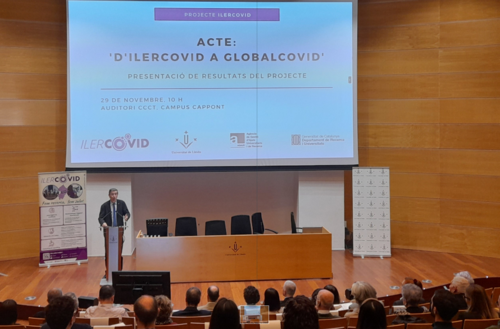More than 800 people attend the workshops and talks of the IlerCOVID project
The initiative has also developed a virtual museum and two epidemiology applications
More than 800 people from Segrià have participated in the workshops and talks of the research project IlerCOVID Education and communication with a scientific basis to combat COVID-19 and future pandemics of the University of Lleida (UdL). This was announced today by those responsible for the project during the presentation of results, which took place in the Auditorium of the Centre for Cultures and Cross-Border Cooperation. With a budget of 350,000 euros from the Department of Research and Universities of the Government of Catalonia and a duration of 18 months, the initiative has also served to create a virtual museum on pandemics, the IlerCOVID Museum, and two applications on epidemiology: COVIDWORLD and EpiPlay.
IlerCOVID is the first multidisciplinary project developed by six UdL centres - the Higher Polytechnic School (EPS), the Faculty of Education, Psychology and Social Work (FEPTS), the Higher Technical School of Agricultural Engineering (ETSEA), the Faculty of Medicine, the Faculty of Nursing and Physiotherapy (FIF) and the Faculty of Arts - together with the Agrotechnology Research Centre Foundation (Agrotecnio) and the Lleida Biomedical Research Institute (IRBLleida). The aim was to promote scientific education of the Segrià population about COVID-19.
Research staff from the FIF travelled to 22 villages in the region to give educational talks, aimed above all at the elderly, promoting healthy lifestyle habits and emotional management. Meanwhile, students from 14 public high schools have visited the ETSEA to participate in the workshops "Learning to produce vaccines in plants" and to learn about how pharmacological products can be developed through the genetic editing of plants.
The project leader, ICREA professor and principal investigator of the Applied Plant Biotechnology group at the UdL and Agrotecnio Paul Christou, stresses that "IlerCOVID has been an extremely innovative project because of its horizontal integration of science, art, education and humanities that has fulfilled its objectives and has laid the foundations for multidisciplinary initiatives that aim to have an impact on society".
The virtual museum looks at three aspects of the most prominent pandemics in history: history, art, and the scientific and social lessons they have left behind. The museum is open to the research community, experts in the history of medicine, artists and the general public, and is available in three languages: Catalan, Spanish and English. Meanwhile, the applications are aimed at the general public, politicians and epidemiologists.
Text: Communication IlerCOVID / Press UdL
More information: Web

The Rector of the UdL, during the presentation / Photo: Communication IlerCOVID






